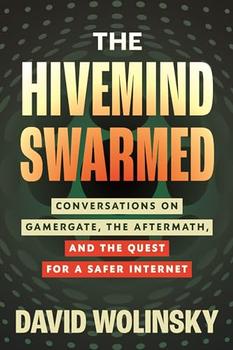
Conversations on Gamergate, the Aftermath, and the Quest for a Safer Internet
by David Wolinsky
An incisive oral history that brings together the voices of major figures in gaming, tech, media, and politics to reflect on the long shadow of Gamergate
With The Hivemind Swarmed, oral historian and documentary researcher David Wolinsky invites readers to sit in on a series of urgent, intimate conversations between some of the most distinguished voices across entertainment and media as they reflect on the longstanding impact of Gamergate. What went wrong, and what can we learn from Gamergate to help us build a more equitable online world?
The backstory: 10 years ago, a disgruntled software developer named Eron Gjoni posted online to accuse his ex-girlfriend, game developer Zoë Quinn, of sleeping with game critics in exchange for positive reviews. He offered no evidence to back up his claims. However, his posts were picked up by extremists in the gaming community who built a vicious online movement targeting women, minorities, and progressive voices. Rallying under the hashtag #gamergate, they sent their victims round-the-clock death and rape threats. Game companies, for the most part, declined to take action as their female employees were harassed out of their jobs. The FBI launched an investigation but found "no true threat."
Gamergate holds the grim distinction of being the first modern online harassment campaign. It arguably served as a model for the alt-right movement that would help propel Trump to the White House. And it highlighted a toxic media culture—not just in gaming, but in film, TV, journalism, and more—in which leaders, through their passivity, took the side of the oppressor. Now, ten years later—in the wake of #MeToo, Charlottesville, the Trump years, and the January 6 insurrection—the questions discussed here are more important than ever.
"Out of the transient and ephemeral effluvia of the internet comes something ivied, revelatory, permanent. Bravo." —Ken Burns, filmmaker
"David Wolinsky has compiled a raw, vital, illuminating, and frequently upsetting oral history of how a medium that excels at escapist fun has transformed into something so woefully unfun." —Tom Bissell, author of Extra Lives and coauthor of The Disaster Artist
"Presents a panoply of voices from leading thinkers discussing how video games and internet culture promote hate and misogyny. It's impossible to read Wolinsky's fascinating interviews without becoming aware of how tech is promoting our worst selves and tearing our societies apart. The book is a much needed, wide-ranging conversation that puts to rest once and for all any claims that the Internet is 'just a tool.'" —Nancy Jo Sales, author of American Girls: Social Media and the Secret Lives of Teenagers
"The American sociopolitical landscape isn't like a videogame. It is a videogame. David Wolinsky's accessible oral history of how we came to live inside the Gamergate phenomenon is perhaps the truest rendering yet of our digital society and what we might do about it." —Douglas Rushkoff, author of Team Human
This information about The Hivemind Swarmed was first featured
in "The BookBrowse Review" - BookBrowse's membership magazine, and in our weekly "Publishing This Week" newsletter. Publication information is for the USA, and (unless stated otherwise) represents the first print edition. The reviews are necessarily limited to those that were available to us ahead of publication. If you are the publisher or author and feel that they do not properly reflect the range of media opinion now available, send us a message with the mainstream reviews that you would like to see added.
Any "Author Information" displayed below reflects the author's biography at the time this particular book was published.
David Wolinsky is an independent oral historian, a documentary researcher, and an author based in Chicago. Previously, he served as an editor at The Onion and NBC. Since 2014, he has conducted more than 600 interviews on the social impact of the Internet for his interview series Don't Die, which is preserved by Stanford University. He is a recipient of the New York Videogame Critics Circle's Journalism Award and the MIT Open Documentary Lab's mentorship.
Your guide toexceptional books
BookBrowse seeks out and recommends the best in contemporary fiction and nonfiction—books that not only engage and entertain but also deepen our understanding of ourselves and the world around us.